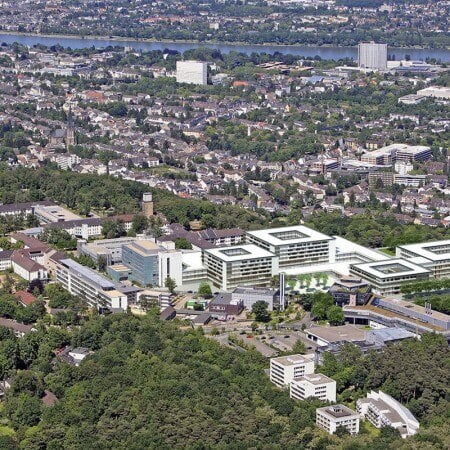Pituitary dwarfism (nanism) is a congenital or acquired growth hormone deficiency, which leads to short stature. Modern medicine has learned how to cope with this disease. If it is detected in time, and well-performed therapy is started, then pituitary dwarfism does not cause any damage to the health and appearance of a person. You can undergo diagnostics and treatment of pituitary dwarfism in Germany in order to count on the best results.
Content
- Causes and clinical types of dwarfism
- Conservative treatment
- Rehabilitation of adult patients
In childhood, pituitary dwarfism can be cured by injections of growth hormone. In adults, it is impossible to increase growth with hormones. The only solution to the problem is to increase the length of the limbs surgically. In Germany, this is a sparing, safe treatment with compact osteosynthesis devices.
You can contact the following clinics: University Hospital of Ludwig Maximilian University of Munich, University Hospital Carl Gustav Carus Dresden, Hospital Neuperlach Munich.
When booking a treatment through the Booking Health service, you do not have to arrange your trip yourself. We will do everything for you: we will make an appointment at the clinic, book airline tickets and accommodation, organize a transfer, take care of the translation of medical reports, issue insurance, and provide an interpreter. Booking Health doctors will recommend the clinic and the most effective treatment method for you.
Causes and clinical types of dwarfism
Nanism can be:
As a rule, acquired nanism is a consequence of an operation or pituitary gland disorders, which result in irreversible damage to this organ.
Although growth hormone is produced in the pituitary gland, its secretion is affected by the hypothalamus. Its damage can also be the cause of dwarfism. In addition, there are cases when there is enough growth hormone in the blood, but the receptors in the tissues do not respond to it. This phenomenon is called tissue resistance to the action of growth hormone.
Nanism develops as an isolated pathology only in 25% of cases. There is an impairment of the formation of other pituitary hormones in 75% of patients. Nanism is most often combined with:
- hypothyroidism is a secondary deficiency of thyroid hormones due to impaired production of thyroid-stimulating hormone by the pituitary gland;
- hypogonadism is a secondary testosterone deficiency due to an impairment of the production of gonadotropic hormones that stimulate the endocrine function of the testicles.
The production of prolactin and adrenocorticotropic hormone is less often affected. Approximately 10% of patients have reduced production of all pituitary hormones.
Conservative treatment
If the production of growth hormone is not sufficient, it can be taken in the form of drugs. This type of treatment is called replacement therapy.
Recombinant somatotropin (growth hormone) has been used in medicine since 1985. Thus, the world experience of successful treatment of pituitary dwarfism has lasted more than half a century. As of today, the number of people receiving growth hormone injections in the world is in the hundreds of thousands.
Somatotropin is administered subcutaneously. Injections are usually performed once daily, in the evening. The most accelerated growth of the child is observed in the first year after the start of therapy: it reaches 8-13 cm. In the future, growth increases by 5-6 cm annually. The effect can be controlled by adjusting the dose of growth hormone.
Rehabilitation of adult patients
In adults, the growth zones are already closed. There is no point in using somatotropin: in adults, only the superciliary arches and hands grow from it, but the body length does not increase. Once the final growth has been achieved, the only way to "grow" is through surgery.
It is possible to increase height by several centimeters, and even tens of centimeters, by lengthening the bones of the lower leg and thigh. This effect is achieved through a surgery, during which doctors cut the bones and then gradually separate their ends. Bone tissue is formed between bone fragments. This treatment method is called osteosynthesis. When the final result is achieved, the bones are no longer diverged. After a few months, the bone tissue hardens due to the deposition of calcium salts inside it.
The classic version of the operation to increase height is traumatic and inconvenient for the patient. In addition, half of the patients develop complications.
However, German doctors do not resort to outdated methods. Specialists in German clinics use modern devices to increase the patient's height, which:
- are small and easily hidden under clothing;
- are implanted through a smaller surgical access;
- are equipped with electric motors that are remotely activated – pins will not stick out of the bones for months;
- allow a person to walk and generally lead a normal life;
- do not require a permanent stay in the hospital;
- are removed in a minimally invasive way, without major revision surgery.
There are two systems in the world for increasing the length of bones, which have become most widespread: the German Fitbone and the American Precice. They are the safest and the most comfortable for the patient.
The length of the limbs, when using the device, increases by an average of 1 mm per day. The person can add about 3 cm in height each month. The growth rate can be doubled by increasing the height of two bones at the same time: the tibia and the femur. The device stays in the human body for about 3 months. Then the same amount of time will be required to strengthen the new bone tissue.
You can undergo treatment for pituitary dwarfism in one of the medical centers in Germany. In childhood, therapy is carried out with growth hormones. Adult patients can visit the Department of Orthopedics to increase their height. You are welcome to use the Booking Health service to find out costs and book a treatment at a favorable price. Our specialists will select the best clinics in Germany for you and arrange your trip.
Authors:
This article was edited by medical experts, board-certified doctors Dr. Nadezhda Ivanisova, and Dr. Bohdan Mykhalniuk. For the treatment of the conditions referred to in the article, you must consult a doctor; the information in the article is not intended for self-medication!
Our editorial policy, which details our commitment to accuracy and transparency, is available here. Click this link to review our policies.
Sources:
National Library of Medicine
PubMed




















